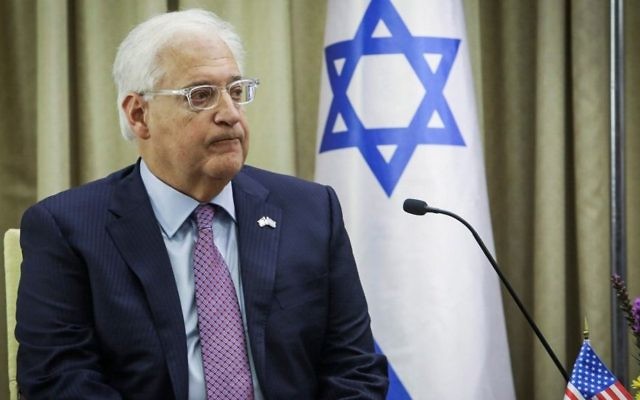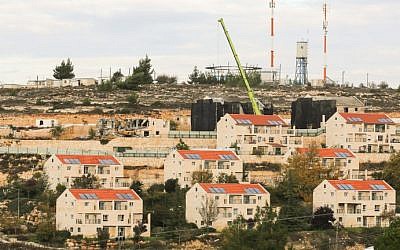State Department spokeswoman says David Friedman’s statement should ‘not be read as a shift in US policy’

WASHINGTON — For the second time since David Friedman assumed his post as US ambassador to Israel, the US State Department has publicly rejected remarks he made pertaining to Israel’s presence in the West Bank as not reflecting the administration’s stance.
On Thursday afternoon, spokesperson Heather Nauert told reporters that Friedman’s comments in an interview with the Israeli Walla news websitethat he considers West Bank “settlements are part of Israel” should “not be read as a shift in US policy.”
“I just want to be clear that our policy has not changed,” she added, with emphasis. ”I want to be crystal clear.”
Far from considering settlements to be part of Israel, American foreign policy has traditionally held that Israeli settlement construction in the West Bank and East Jerusalem is an obstacle to peace. Israel, which annexed East Jerusalem after the 1967 Six Day War and does not regard construction there as part of the settlement enterprise, has never claimed sovereignty in the West Bank.
In the Walla interview, Friedman cited UN Security Council Resolution 242, which passed in November 1967, that said a Middle East peace deal should include a withdrawal of “Israeli armed forces from territories occupied in the recent conflict.”
A common argument made by the Israeli right-wing is that the resolution didn’t say “the territories” or “all the territory” — leaving an opening for Israel to retain parts of the land it captured.
“When Resolution 242 was adopted in 1967, it was, and remains today, the only substantive resolution that was agreed to by everybody,” Friedman told Walla. “The 1967 borders were viewed by everybody as not secure, so Israel would retain a meaningful portion of the West Bank, and it would return that which it didn’t need for peace and security.”
“They (Israelis) are only occupying 2 percent of the West Bank,” he said.
Israel captured the West Bank in the 1967 Six-Day War. The Palestinians have limited autonomy in 40 percent of the area, with Israel in full control over the remaining 60 percent. Palestinians demand the West Bank as part of a future state.
The Palestinians, along with much of the international community, view Israel’s West Bank settlements as illegal and an obstacle to peace. Israel disputes this, saying the fate of the settlements must be resolved through negotiations with the Palestinians.
“I think the settlements are part of Israel,” Friedman said. “I think that was always the expectation.”
“Obviously, there is important security considerations to those settlements, there’s important nationalistic, historical and religious significance to those settlements and I think the settlers view themselves as Israelis, and Israel views the settlers as Israelis,” Friedman said.
Nabil Shaath, an aide to Palestinian Authority President Mahmoud Abbas, responded in a video clip on Twitter that the US ambassador had displayed “absolute ignorance of facts of law and of the position of the United States.”
Friedman’s remarks are “very bad news for the future of any American attempt to make peace in the Middle East,” Shaath added.
Senior Palestinian negotiator Saeb Erekat called Friedman’s comments “false and misleading.” He said in a statement that “such positions undermine ongoing efforts toward achieving a just and lasting peace between Israel and Palestine,” based on 1967 borders.
While the Trump administration has been far less rigid on rejecting settlement activity issue than Barack Obama’s administration, the president himself has been clear that he views ongoing settlement construction as hurtful to the prospect of peace.
The State Department as well has mostly maintained its stance that settlements are detrimental to peace efforts.
During a joint press conference with Prime Minister Benjamin Netanyahu in February, Trump told him: “I’d like you to hold back on settlements for a little bit.”
On Wednesday, Netanyahu told settler leaders that Trump had told him not to be a “hazer” — the Hebrew word for pig — on settlements.

During the campaign, Friedman, an Orthodox Jew, became known for his aggressive nature and hard-right views regarding Israel’s conflict with the Palestinians.
In the past, Friedman has been a staunch supporter of the settlement movement. Before taking up his post, he served as president of American Friends of Bet El Institutions, an organization that supports the large West Bank settlement near Ramallah, and he has a long history of excoriating groups who criticize Israel’s settlement policy.
Earlier this month, Nauert was forced to clarify another statement Friedman made to Israeli media, in which he referred to Israel’s “alleged occupation” of the West Bank.
“Our position on that hasn’t changed,” Nauert told reporters. “The comment does not represent a shift in US policy.”
As reported by The Times of Israel
